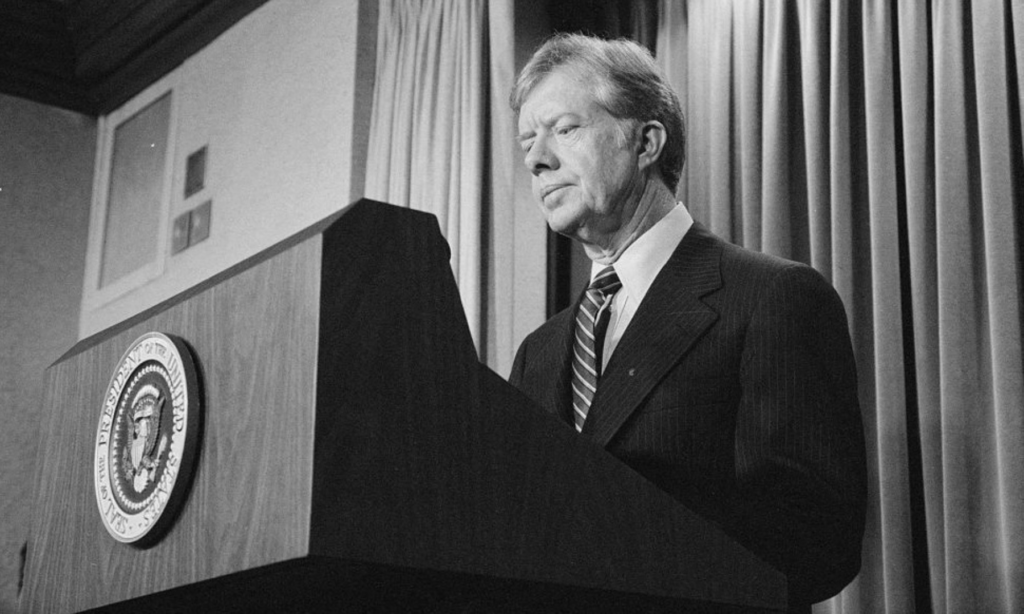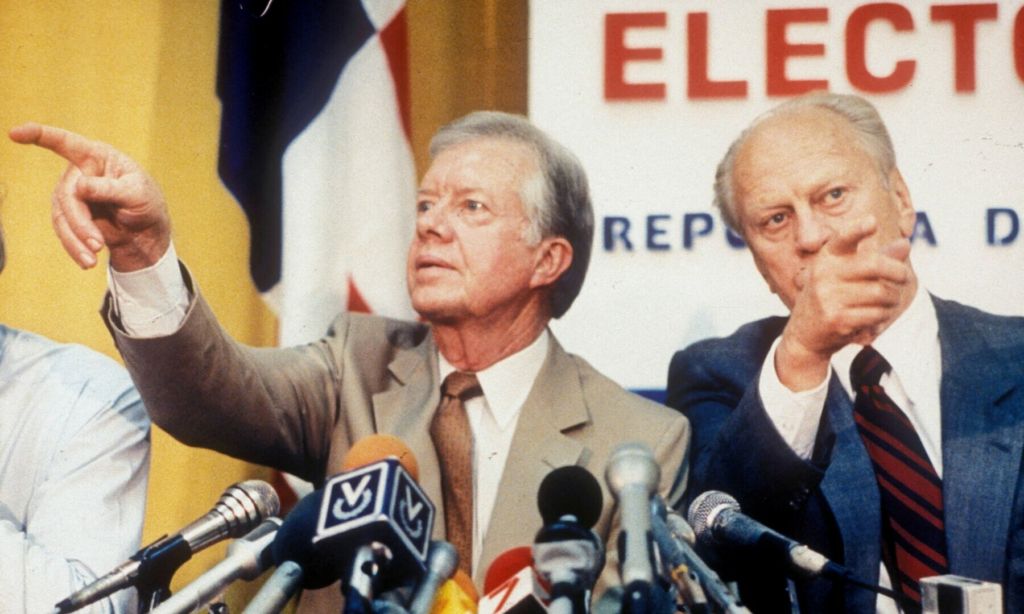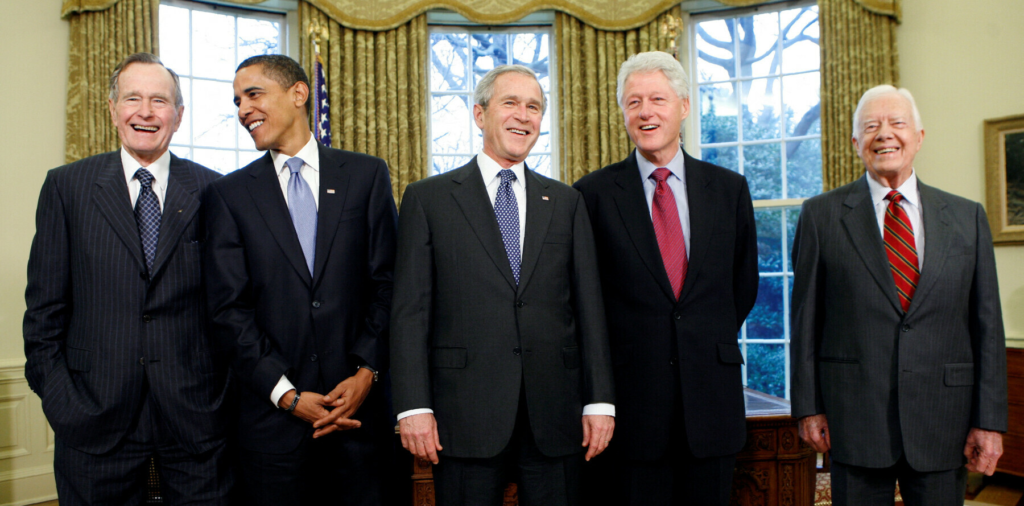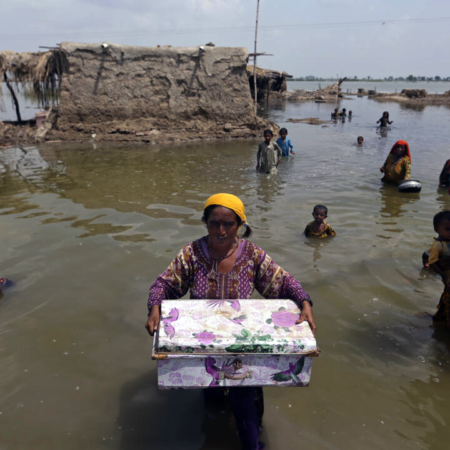Jimmy Carter, a dedicated Georgia peanut farmer who, while serving as US president, battled a faltering economy and the hostage situation in Iran, mediated peace between Israel and Egypt, and went on to win the Nobel Peace Prize for his humanitarian efforts, passed away on Sunday at his Plains, Georgia, home. He was 100 years old.
According to a White House announcement, US President Joe Biden ordered that January 9 be observed as a national day of mourning for Carter across the country.
In order to honor President James Earl Carter’s memory, Biden urged the American people to gather on that day in their individual houses of worship.
After beating incumbent Republican President Gerald Ford in the 1976 election, Democrat Carter took office as president in January 1977. The highlights of his one-term administration was the 1978 Camp David Accords between Egypt and Israel, which provided some calm to the Middle East.

However, it was also plagued by a recession, ongoing disapproval, and the hostage situation in Iran, which took up his last 444 days in office. When Carter stood for reelection in 1980, voters overwhelmingly supported Republican opponent Ronald Reagan, a former actor and governor of California, and he lost the election.
“I am saddened to learn of the passing of former US president Jimmy Carter. I offer my sincere condolences to his family members and the American people,” Prime Minister Shehbaz Sharif said on X. Carter lived longer than any US president and gained a reputation as a dedicated humanitarian after leaving the White House.
He was widely regarded as a better former president than he was a president, a status he readily acknowledged. World leaders and former US presidents paid tribute to a man they praised as compassionate, humble, and dedicated to peace in the Middle East.
The Carter Center stated that final preparations for the former president’s state funeral are still pending and that public observances will take place in Atlanta and Washington, followed by a private interment in Plains.
“His significant role in achieving the peace agreement between Egypt and Israel will remain etched in the annals of history,” Egyptian President Abdel Fattah al-Sisi wrote in a post on X.
Carter had a number of health problems in the last few years, including melanoma that had spread to his brain and liver. In February 2023, Carter made the decision to accept hospice care rather than pursue further medical treatment. On November 19, 2023, Rosalynn Carter, his wife, passed away at the age of 96. When he used a wheelchair to attend her funeral and memorial service, he appeared weak.

Carter left office terribly disliked yet worked energetically for decades on humanitarian concerns. His “untiring effort to find peaceful solutions to international conflicts, to advance democracy and human rights, and to promote economic and social development” earned him the Nobel Peace Prize in 2002.
Prior to becoming the 39th president of the United States, Carter was a centrist governor of Georgia with populist leanings. At a time when America was still in the wake of the Watergate affair, which caused Republican Richard Nixon to resign as president in 1974 and promote Ford from vice president, he was an outsider in Washington.
“My name is Jimmy Carter, and I’m a presidential candidate. With an ear-to-ear grin, Carter vowed to never lie to you.
In a 1991 documentary, when asked to evaluate his presidency, Carter stated: “The biggest failure we had was a political failure.” I was never successful in persuading the American people that I was a powerful and assertive leader.
Carter won the Nobel Peace Prize in 2002 for his efforts to advance human rights and resolve conflicts worldwide, from Ethiopia and Eritrea to Bosnia and Haiti. His Carter Center in Atlanta sent international election-monitoring delegations to polling places around the world.
Despite his challenges in office, Carter had few rivals for successes as a former president. He gained international acclaim as a tireless human rights advocate, a voice for the disenfranchised, and a leader in the fight against hunger and poverty, earning the respect that eluded him in the White House.

The Middle East was the focus of Carter’s foreign policy. The 1979 Egypt-Israel peace treaty, which was based on the 1978 Camp David Accords, ended a state of war between the two neighbors.
Carter brought Egypt’s president Anwar Sadat and then-Israeli prime minister Menachem Begin to the Camp David presidential retreat in Maryland for talks. Later, when the accords seemed to be falling apart, Carter saved the day by flying to Cairo and Jerusalem for personal shuttle diplomacy.
Carter, a Southern Baptist Sunday school teacher since his teens, brought a strong sense of morality to the presidency; he openly discussed his religious beliefs and tried to detract from an increasingly imperial presidency.
The deal called for diplomatic relations to be established for Israel to leave the Sinai Peninsula in Egypt. In 1978, Sadat and Begin each received a Nobel Peace Prize.
Double-digit inflation, interest rates above 20%, skyrocketing gas prices, and the Iran hostage situation, which humiliated America, were the main concerns by the time of the 1980 election. Carter’s presidency was tarnished by these problems, which also hurt his chances of obtaining a second term.
Crisis of hostages
Revolutionaries loyal to Iran’s Ayatollah Ruhollah Khomeini attacked the US Embassy in Tehran on November 4, 1979, took the Americans inside, and demanded the return of the overthrown Shah Mohammad Reza Pahlavi, who was receiving medical care in a US hospital and had the support of the US.
At first, the American people supported Carter. However, after a commando attack failed to free the hostages and eight US soldiers were killed in an aircraft mishap in the Iranian desert in April 1980, his backing waned.
Iran detained the 52 hostages until minutes after Reagan took office to succeed Carter on January 20, 1981, and then released the planes that were taking them to freedom. This was Carter’s final humiliation.
In a different dilemma, Carter boycotted the 1980 Moscow Olympics in protest over the 1979 Soviet invasion of Afghanistan. Additionally, he requested that the US Senate postpone deliberations on a significant nuclear arms deal with Moscow.

The Soviets were unmoved and stayed in Afghanistan for ten years.
Despite detractors who said the waterway was essential to American security, Carter narrowly prevailed in the 1978 Senate vote to approve a deal giving Panama management of the Panama Canal. Additionally, he concluded talks on full US relations with China.
Carter established education and energy as two new US Cabinet departments. In the face of soaring petrol costs, he called America’s “energy crisis” “the moral equivalent of war” and called on the nation to adopt conservation. In 1977, he declared to Americans, “Our country is the most wasteful on the planet.”
Carter gave the country what became known as his “malaise” speech in 1979, though he never used that term.
He stated in his televised speech, “After listening to the American people, I have been reminded again that all the legislation in the world can’t fix what’s wrong with America.”
In everyday situations, the threat is almost imperceptible. There is a crisis of trust. This dilemma goes right to the core of our country’s spirit, soul, and will. America’s social and political fabric is in danger of being destroyed as our faith in the future erodes.
The behavior of his hard-drinking younger brother, Billy Carter, who boasted, “I got a red neck, white socks, and Blue Ribbon beer,” embarrassed the stifled Carter, who was president.
“There you go again.”
Senator Edward Kennedy of Massachusetts challenged Jimmy Carter for the Democratic presidential nomination in 1980, but Carter was politically debilitated before facing a fierce Republican opponent in the general election.
During their debates prior to the election in November 1980, Reagan, the conservative who presented a strong image, kept Carter off balance.
When the Republican opponent believed the president had distorted Reagan’s opinions at one debate, Reagan sarcastically said, “There you go again.”
Reagan won 44 of the 50 states and a landslide victory in the Electoral College, defeating Carter in the 1980 election.
A farmer and shopkeeper had four children, including James Earl Carter Jr., who was born in Plains, Georgia, on October 1, 1924. After serving in the nuclear submarine program after graduating from the US Naval Academy in 1946, he departed to run the family’s peanut farm.
In 1946, he wed Rosalynn, whom he referred to as “the most important thing in my life.” They had a daughter and three sons.
Carter became a millionaire, served as Georgia’s governor from 1971 to 1975, and was a state politician. He outperformed his opponents to earn the opportunity to run against Ford in the main election and launched an underdog campaign for the Democratic presidential nomination in 1976.
A significant Ford blunder during one of their debates helped Carter, who had Walter Mondale as his running mate for vice president. Despite decades of precisely this kind of oppression, Ford declared that “there is no Soviet domination of Eastern Europe and there never will be under a Ford administration.”
Despite the fact that Ford won more states than Carter (27 to 23), Carter nevertheless won the election.

Carter’s post-presidential efforts were not all well received. It was reported that Carter’s solo diplomacy in Iraq and other places had angered former Republican presidents George W. Bush and his father, former president George H.W. Bush.
Carter referred to the 2003 Bush administration’s Iraq war as one of the most “gross and damaging mistakes our nation ever made” in 2004. He described Vice President Dick Cheney as “a disaster for our country” and referred to George W. Bush’s administration as “the worst in history.”
Carter questioned Republican Donald Trump’s legitimacy as president in 2019, claiming that “Russians meddled on his behalf to put him in office.” In response, Trump referred to Carter as “a terrible president.”
Carter visited totalitarian North Korea as well. President Kim Il Sung decided to stop his nuclear program in exchange for renewed talks with the United States during a visit in 1994, which prevented a nuclear catastrophe. This resulted in an agreement whereby North Korea agreed not to restart its nuclear reactor or reprocess the spent fuel from the plant in exchange for help.
However, by publicizing the agreement with the leader of North Korea without first consulting Washington, Carter irritated the government of Democratic President Bill Clinton.
An American who had been condemned to eight years of hard labor for illegally entering North Korea was freed in 2010 thanks to Carter’s efforts.
Carter authored over two dozen publications, including works about religion and diplomacy, a children’s book, poetry, and a presidential biography. In 2018, his book “Faith: A Journey for All” was released.












No Comment! Be the first one.